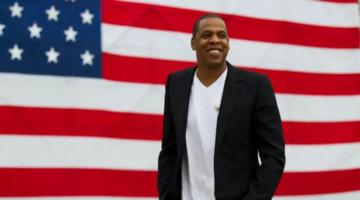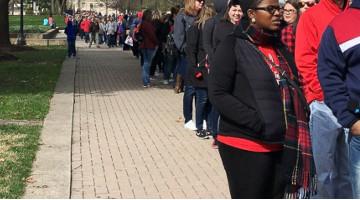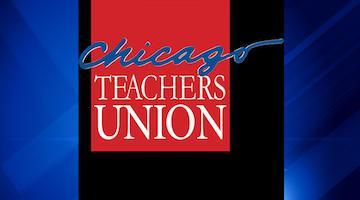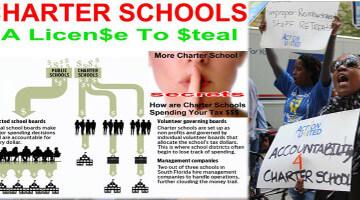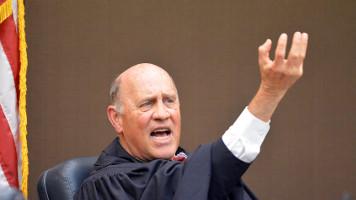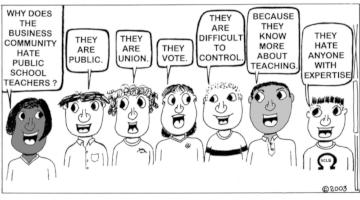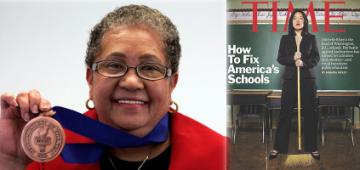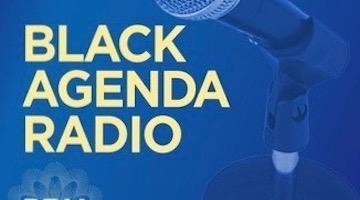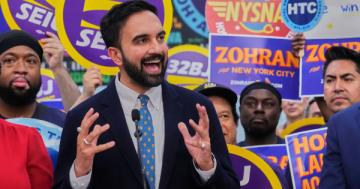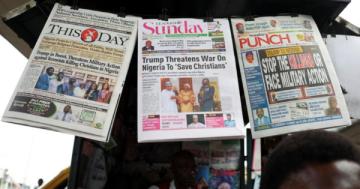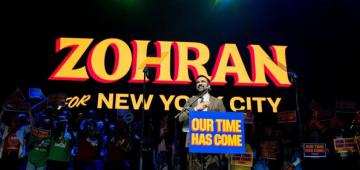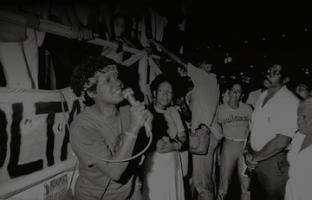“No excuses” teaching borrows from the “broken windows” theory of policing, which has been enacted in U.S. cities since the mid-1980s.
“Students of color are more likely to be seen as perpetrators planning to “break windows” than beautiful multifaceted human beings.”
In the fight for racial justice, teachers have a heavy job, for schools are both microcosms of, and preparation for, society. Because teachers serve as significant adult figures in children’s lives, their interactions with students can shape students’ sense of self and the world around them, as well as their engagement in school, personal efficacy, and academic achievement. Complex and difficult racial dynamics impact these relationships, and as calls for justice grow, it’s time to recognize this.
Systemic racism is sometimes blatant in our schools. For example, it is hard to deny that segregation persists, and that schools serving students of color receive less funding than mostly white schools. In my home state of Arizona, for example, schools serving mostly white students receive an average of $7,600 more per pupil than schools serving students of color, a discrepancy that increases to nearly $11,000 when controlling for neighborhood income. Research also repeatedly reveals that Black students in particular are more likely to be subjected to disciplinary action, much of which removes them from classrooms and schools. Sometimes this even leads students directly into interactions with law enforcement, hence the moniker school-to-prison pipeline. But there is a subtler form of racism at play in many classrooms, one that expresses itself in the way teachers (82 percent of whom are white nationwide) form relationships with their students.
In my research on pre-service teacher education, I found that preparation around race and relationships is both uneven and inequitable—with disturbing implications for students of color.
A Tale of Two Schools
Let me set the scene for you. A tale of two schools, if you will, and the teacher education programs operating out of these schools.
The first teacher education program sits in a century-old progressive independent school on a pastoral hill in an affluent part of town. This place seems so disconnected from the realities of the world beyond its walls that I give it the pseudonym Xanadu. But it offers a privileged reality for the mostly white and affluent students it serves. The teacher education program embedded in Xanadu draws upon its unique setting to prepare teachers who can form what I call reciprocal relationships with students, relationships that reinforce the humanistic standard set out by philosophers like Martin Buber.
At Xanadu, teacher candidates first engage in deep personal reflection about who they are and why they have chosen to teach. They then learn about students as whole people—with hopes, dreams, fears, and complex personal lives—and in turn design responsive lessons around these students. These relationships foster dialogue and critical thinking in response to both diverse texts and current events, such as the Black Lives Matter protests. In these reciprocal interactions, students have agency and become co-constructors of their learning experience. The teacher candidates immersed at Xanadu learn to conceive of classroom management as an extension of these relationships, unfolding in gentle conversations with students, who are never removed from the classroom for perceived behavioral infractions. Instead, there is more dialogue, in which students are seen and heard and learn that their belonging in school and society is unconditional. These students learn to become leaders.
Then there is the teacher education program that emerged out of a “no excuses” charter school that I call Excellence Preparatory High School. Located in the same metropolitan area, it is separated from Xanadu by a river and what seems like a world. Occupying a large industrial building in a gentrifying neighborhood, this school is grounded in the no excuses educational philosophy; this philosophy essentially suggests that to close the “achievement gap” (a term Ibram Kendi argues is inherently racist because it establishes a racial hierarchy based on measures white elites deem important), students of color from low-income backgrounds must be held to unrelenting academic and behavioral standards, without exceptions. In this program, teacher candidates learn to form relationships that are unapologetically instrumental: teachers employ discrete moves to cultivate “professional relationship capital” with students so students are more likely to work hard and behave in line with school norms.
As part of my research, I embedded myself in both these schools to observe how different theories of teaching and relationships play out in the real world. In my new book, Learning to Connect: Relationships, Race, and Teacher Education, I recount what it was like to see these two divergent approaches in action and what this means for students, teachers, and society as a whole.
Broken Windows Teaching
No excuses teaching borrows from the “broken windows” theory of policing, which has been enacted in U.S. cities since the mid-1980s. Simply stated, the theory holds that cracking down on minor infractions (e.g., vandalism, as in the case of broken windows) leads to less overall crime and safer, more peaceful communities. However, research sheds doubt upon the efficacy of this approach, while the harms it has inflicted upon the communities where it was enacted are clear. Broken windows policing, which transitioned into “stop and frisk,” has led to the increased incarceration and criminalization of people of color in low-income neighborhoods.
In the “no excuses” program, it was easy to recognize the influence of the broken windows theory on their approach to classroom management. Early no excuses leaders were heavily influenced by this theory, believing that if teachers could “sweat the small stuff” by regulating everything from the color of a student’s socks to their posture and eye contact through classroom management “moves” and a series of punishments (e.g., demerits, send-outs, suspensions, expulsions), they could eliminate disorder and focus on instruction. This approach appeared to improve students’ test scores, so no excuses education spread. But the problem with treating students like perpetrators looking to break windows is that it strains or severs their relationships with teachers, who are the enforcers of these rules. When applying behaviorism, punishment is more effective when paired with positive reinforcement.
This is why the no excuses teacher education program in my study created a whole course on relationships and student investment. In this course, teacher candidates were taught to intentionally emphasize “positive narration” to affirm students for desired behaviors, integrate a school’s espoused character traits into coursework with big and little celebrations when students demonstrate these, and acquire “little nuggets” about students to work into their conversations so that students feel seen by teachers. While disciplinary actions are clearly sticks, these relational “moves” serve as carrots—systematically dangling the promise of adult approval and connection to induce student compliance. This program rarely asked their mostly white teacher candidates to engage in self-reflection or discuss controversial and potentially transformative events like politics and protests; but it did advocate for planned conversations with students about the need to adopt the “codes of the culture of power” so students could navigate school and society, without questioning it. Students were never really given a voice, but the illusion of one ensured that all the school windows remained intact.
Reckoning
The results of this research reveal a two-tiered system of education. Graduates from the program at Xanadu went on to work at independent or suburban public schools in affluent areas, carrying their tools for reciprocal relationship development to mostly white students (a problematic phenomenon I discuss more in the book). Meanwhile, the graduates of the no excuses program went to Title-1 schools serving mostly students of color. The result was that white students had their innate value reinforced by reciprocal interactions with teachers, while students of color received instrumental interactions geared at conditioning them to become obedient at all times, to navigate white supremacy without challenging it.
While these two different programs may be somewhat idiosyncratic, vestiges of these educational and relational approaches permeate U.S. schools. Across and within schools, and even within classrooms, students of color are still much more likely to be referred to behavioral discipline than white students; they are more likely to be seen as perpetrators planning to “break windows” than beautiful multifaceted human beings who deserve the agency to co-construct their own educational experiences. This is an imbalance that is reflected in society at large, as police officers buy someone like Dylann Roof Burger King after he murdered nine Black people, but kill Breonna Taylor during a no-knock drug search warrant at her apartment. The problem with the “broken windows” theory is that compliance means nothing when the structures themselves are so broken.
This is why education, too, is facing a reckoning. This reckoning has led KIPP schools, one of the most prominent no excuses charter networks, to abandon their motto “Work Hard. Be Nice.” because of its explicit emphasis on student compliance. But meaningful change will not happen within schools like this until they reconsider how they structure student-teacher interactions. Because test scores are not everything; in fact, some research suggests that no excuses schools improve students’ scores, but not their life outcomes. For a school system designed around a theory of policing to change, it will require a lot more than abandoning a simple motto. It will require what Jal Metha calls significant “unlearning.” The same is likely true for our society at large.
We cannot continue to promote the same unjust and oppressive educational structures that have endured for centuries. We need to reimagine education and recruit a more racially diverse teaching force, such that all students have access to the kinds of meaningful, reciprocal, and empowering relationships with teachers that allow them the agency to create their own knowledge and use their voices. The kinds of relationships that can help students learn to build a society where both windows and people remain unbroken.
Victoria Theisen-Homer is an education scholar and author of Learning to Connect: Relationships, Race, and Teacher Education.
This article was produced by Our Schools, a project of the Independent Media Institute.
COMMENTS?
Please join the conversation on Black Agenda Report's Facebook page at http://facebook.com/blackagendareport
Or, you can comment by emailing us at comments@blackagendareport.com

